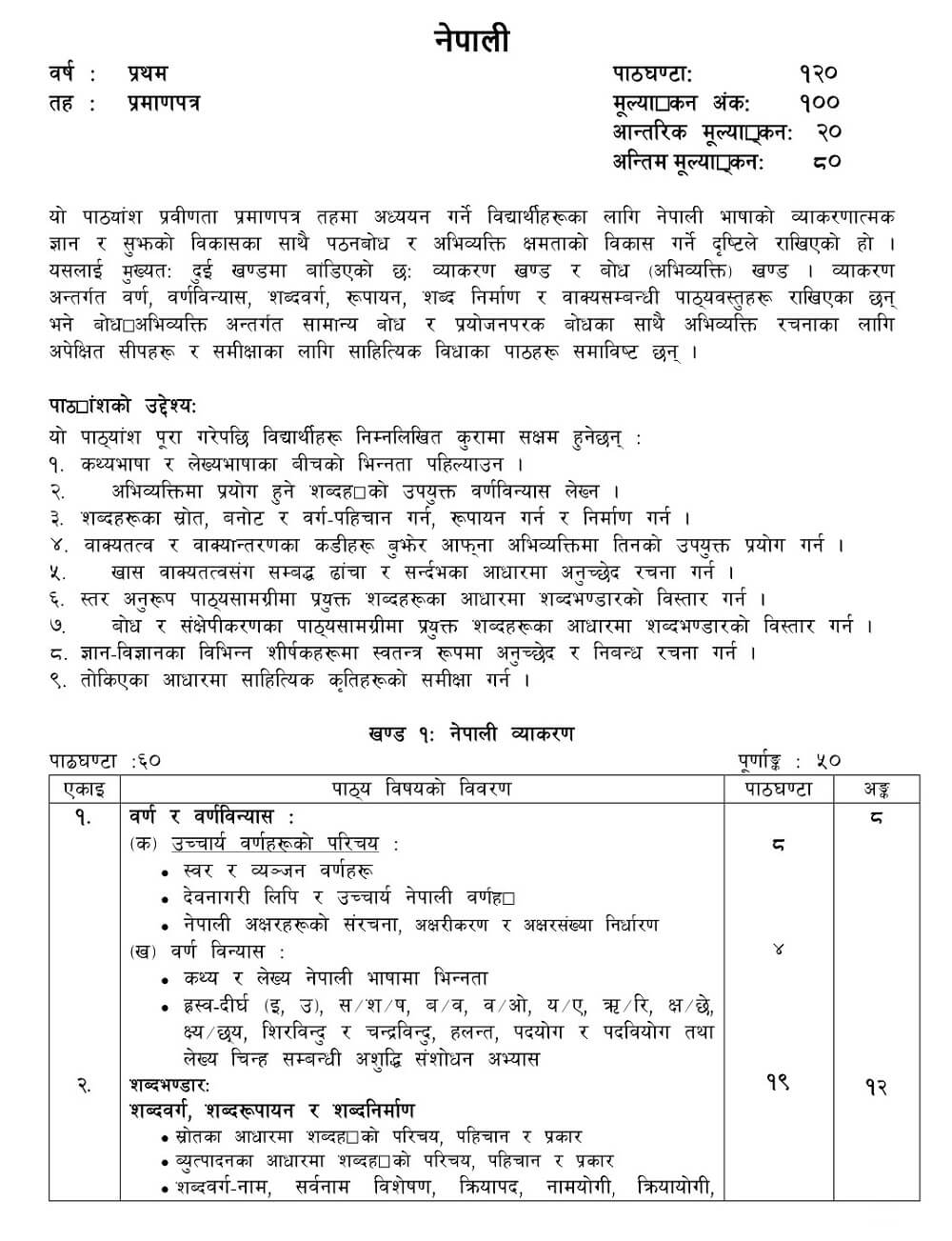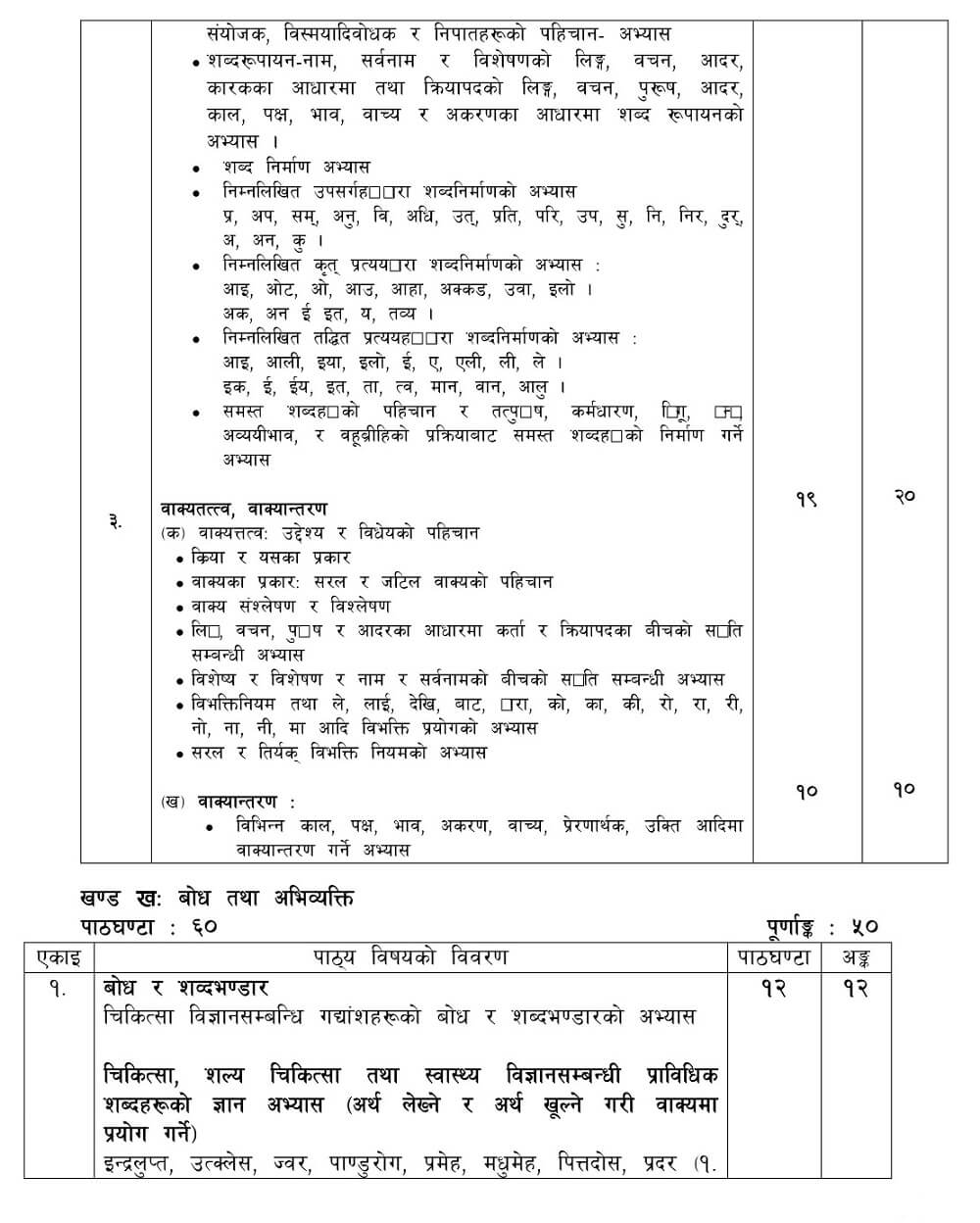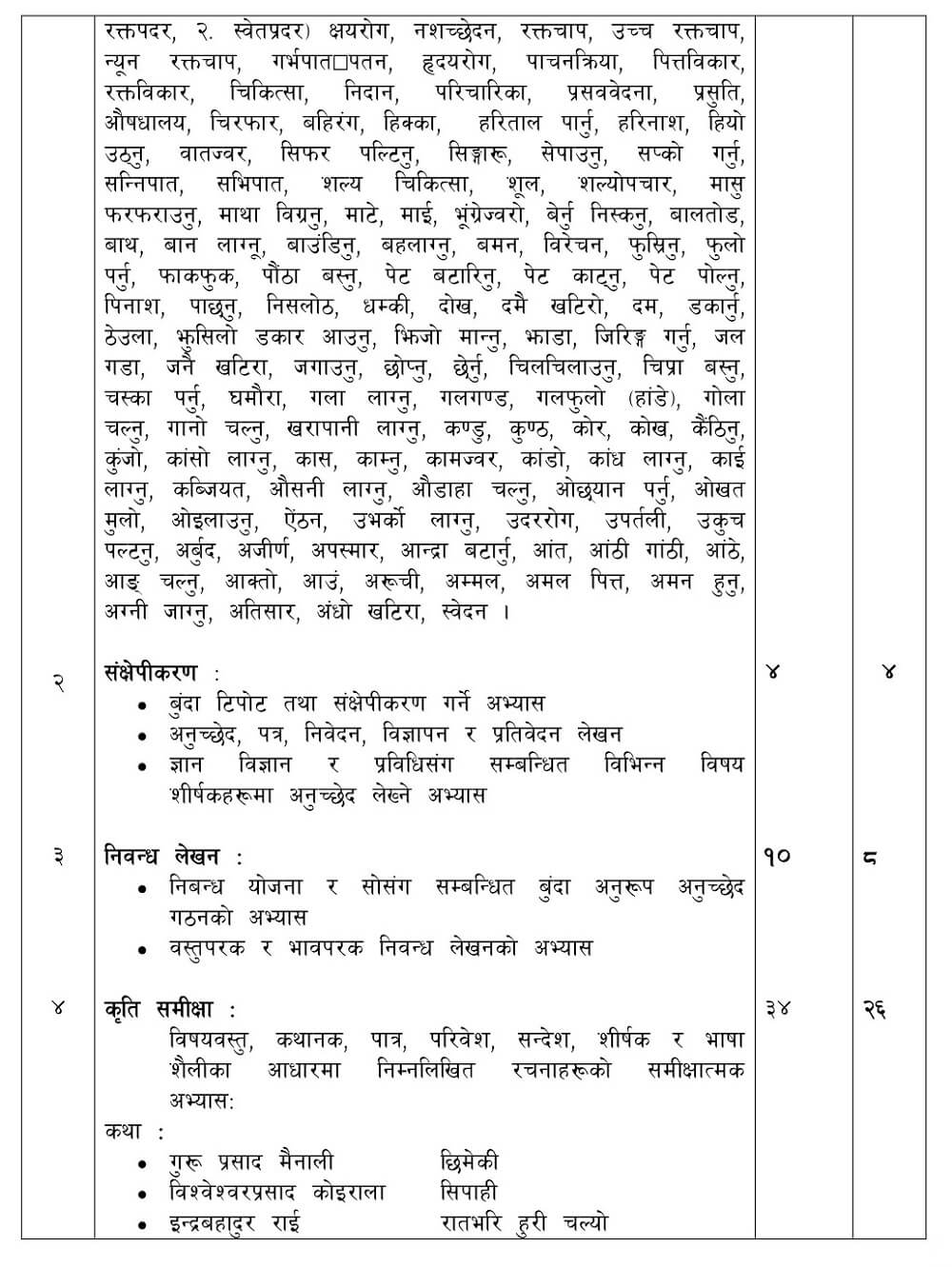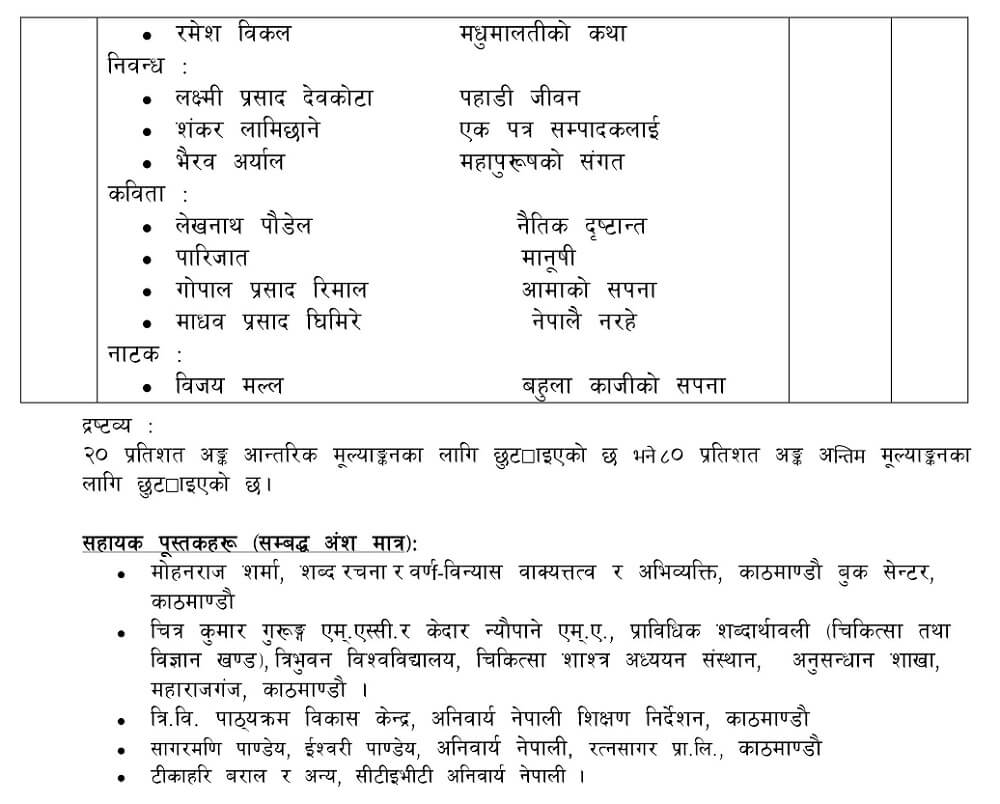Interesting Science Videos
Course Structure of PCL Nursing 1st Year
| S.N. | Course Number | Name of Subjects | Theory Hours | Practical Hours |
| 1 | 501 | Fundamental of Nursing (T) | 160 | |
| 2 | 502 | Fundamental of Nursing (P) | 630 | |
| 3 | 503 | Community Health Nursing I (T) | 120 | |
| 4 | 504 | Community Health Nursing I (P) | 210 | |
| 5 | 505 | Anatomy and Physiology | 100 | |
| 6 | 506 | Basic Science Applied to Nursing (Pharmacology, Biochemistry, Microbiology) | 100 (40, 30, 30) | |
| 7 | 507 | English | 120 | |
| 8 | 521 | Nepali | 120 | |
| Total | 720 | 840 |
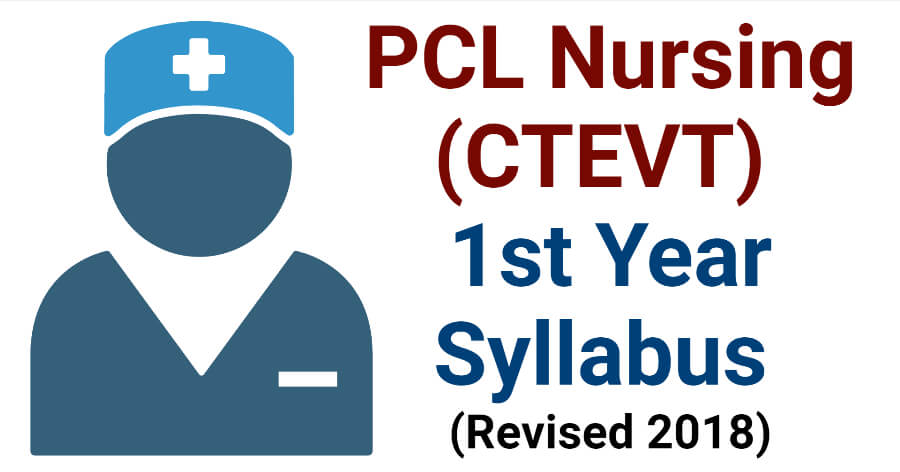
Evaluation Scheme of PCL Nursing 1st Year
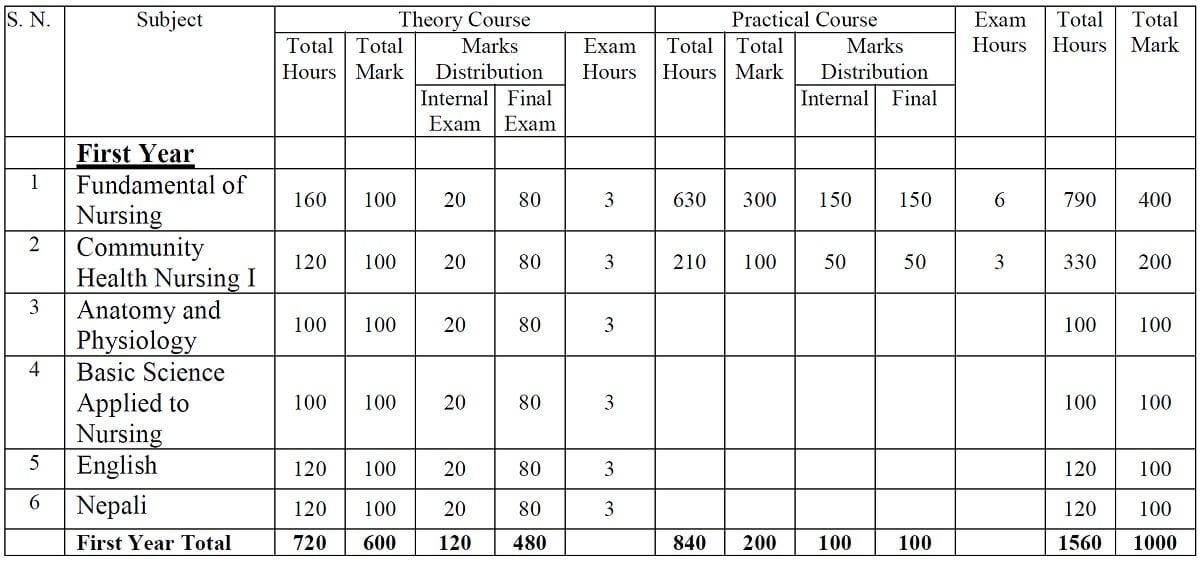
Subject- Fundamental of Nursing (Theory)
Unit 1: Introduction to Nursing (8 hrs)
Unit 2: Introduction to Hospital Nursing (10 hrs)
Unit 3: Basic Need of Individual (8 hrs)
Unit 4: Nursing Process (16 hrs)
Unit 5: Infection Control Measures (15 hrs)
Unit 6: Nursing Measures to Assess the Patient (18 hrs)
Unit 11: Measures to Provide Safety (8 hrs)
Unit 12: Dressing and Bandaging (5 hrs)
Unit 13: Exercise (4 hrs)
Unit 14: Hot and Cold application (3 hrs)
Unit 15: Pre and Post-operative Nursing Care of Patient (4 hrs)
Unit 16: Pain Management (3 hrs)
Unit 17: Client Nurse Interaction (4 hrs)
Unit 18: Drug Administration (6 hrs)
Unit 19: First Aid Management (8 hrs)
Unit 20: Care of Dead Body (2 hrs)
Subject- Fundamental of Nursing (Clinical)
Unit 1: Introduction to the Clinical Practice
1.1 Organizational rule and regulation
1.2 Different units in a hospital.
1.3 Routine activities of the unit
Unit 2: Application of the Nursing Process
2.1 Assessment
2.2 Planning
2.3 Implementation
2.4 Evaluations
Subject- Community Health Nursing I (Theory)
Unit 1: Introduction to Health (8 hrs)
Unit 2: Primary Health Care (6 hrs)
Unit 3: Nursing Practice in the community (2 hrs)
Unit 4: Communications (8 hrs)
Unit 5: Introduction to Epidemiology (10 hrs)
Unit 6: Health indicators and statistics (8 hrs)
Unit 7: Community Health Diagnosis (10 hrs)
Unit 8: Nutrition (10 hrs)
Unit 9: Health Education (8 hrs)
Unit 10: Family Planning (10 hrs)
Unit 11: Immunization (6 hrs)
Unit 12: Environmental Health and Sanitation (16 hrs)
Unit 13: Water (6 hrs)
Unit 14: Housing (8 hrs)
Unit 15: Occupational Health (2 hrs)
Unit 16: Pollution Hazards (2 hrs)
Subject- Community Health Nursing- I (Practical)
Social determinants of Health and Nursing in the community
Communication skills
Primary health care
Vital and health statistics
Environmental health and sanitation
Local resources
Community health diagnosis and Micro Health Project
Recording and report
Subject- Anatomy and Physiology
Unit 1: System Approach to the Human Body- 6 hrs
Unit 2: Introduction to cells and tissues- 6 hrs
Unit 3: Body Fluid and Electrolyte- 10 hrs
Unit 4: Introduction to Circulatory System- 9 hrs
Unit 5: Introduction to Lymphatic System- 6 hrs
Unit 6: Introduction to Muscular System- 6 hrs
Unit 7: Introduction to Skeletal System- 8 hrs
Unit 8: Introduction to Respiratory System- 8 hrs
Unit 9: Introduction to Digestive System- 8 hrs
Unit 10: Introduction to Urinary System- 4 hrs
Unit 11: Introduction to Nervous System- 8 hrs
Unit 12: Introduction to Reproductive System- 8 hrs
Unit 13: Introductions to Endocrine System- 8 hrs
Unit 14: Introductions to Special Sensory Organ- 5 hrs
Subject- Basic Science Applied to Nursing (Pharmacology, Biochemistry, Microbiology)
Bio-Chemistry (30 Hours)
Unit 1: Introduction- 8 hrs
Unit 2: Bio-molecules- 8 hrs
Unit 3: Enzymes– 4 hrs
Unit 4: Blood Coagulation mechanism- 4 hrs
Unit: 5 Organ Function Test- 6 hrs
Microbiology Parasitology/Virology (30 Hours)
Unit 1: Introduction of Microbiology- 6 hrs
Unit 2: Parasitology- 6 hrs
Unit 3: Bacteriology- 6 hrs
Unit 4: Virology- 4 hrs
Unit 5: Immunology- 6 hrs
Unit 6: Mycology- 2 hrs
Pharmacology (40 Hours)
Unit 1: Introduction to Pharmacology- 2 hrs
Unit 2: Drug acting on gastrointestinal system- 6 hrs
Unit 3: Drug acting on respiratory system- 6 hrs
Unit 4: Drug used in cardiovascular system– 6 hrs
Unit 5: Drug used in infection- 6 hrs
Unit 6: Drug acting on the central nervous system- 4 hrs
Unit 7: Endocrine and hormonal drugs- 3 hrs
Unit 8: Drugs acting on Kidney- 2 hrs
Unit 9: Drugs acting on lymphatic system- 2 hrs
Unit 10: Drugs acting on the skin- 2 hrs
Unit 11: Essential drugs, emergency drugs, antidotes- 1 hr
Subject- English
Part 1: Grammar
Unit 1: Link English- 10 hours
Unit 2: Comparison- 5 hours
Unit 3: Prepositions- 5 hours
Unit 4: Tenses- 8 hours
Unit 5: Mood- 7 hours
Unit 6: Modals- 7 hours
Unit 7: The Passive- 4 hours
Unit 8: Reporting- 4 hours
Unit 9: Sentence Structures- 10 hours
Unit 10: Freewriting- 7 hours
Unit 11: Comprehension Passage and Terminologies- 3 hrs
Part: 2 Extensive reading (Literature)
Unit 1: Poems- 12 hours
Unit 2: Supernatural Stories- 12 hours
Unit 3: Stories- 6 hour
Unit 4: Essays- 16 hours
Unit 5: Drama/Play- 4 hours
Subject- Nepali
